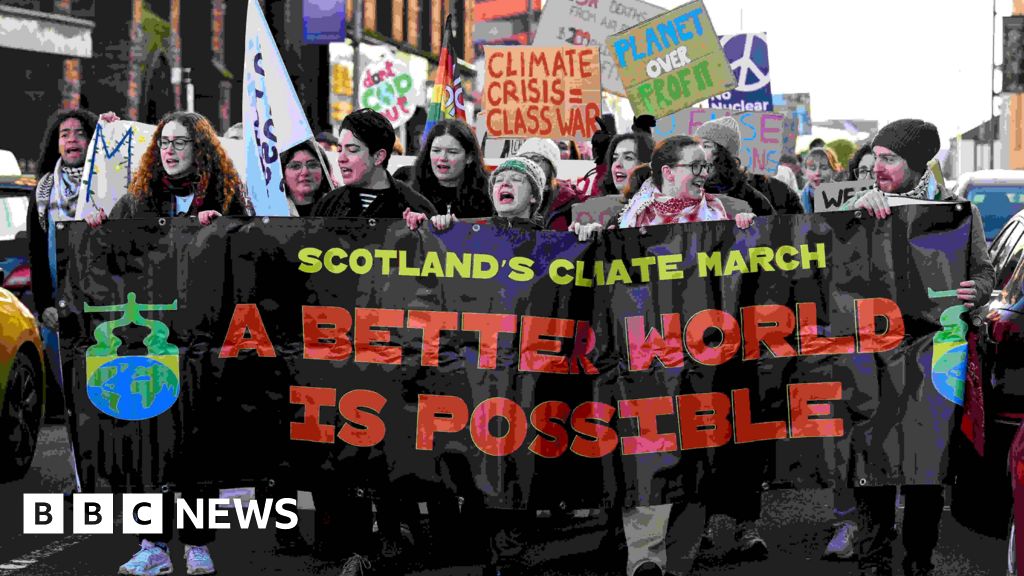Thousands of people gathered in Glasgow to take part in a major climate change protest, marking the largest demonstration in the city since the 2021 COP26 summit. The march through Glasgow’s city centre was part of a global day of action coinciding with the ongoing COP30 climate talks being held in Belém, Brazil. Organised by Friends of the Earth Scotland, the event reflected a growing public demand for urgent, transformative climate action.
The protest culminated in a rally at Glasgow Green, featuring speeches from notable figures such as Dave Moxham, deputy secretary of the Scottish Trades Union Congress (STUC), and Peter Kelly, chief executive of the Poverty Alliance. Caroline Rance, head of campaigns at Friends of the Earth Scotland, highlighted the significance of the large turnout. She expressed optimism, stating that the numbers demonstrated “a growing desire for urgent climate action” and a shared belief that a better world is achievable. Rance emphasized that while enthusiasm and energy for change are abundant, what remains crucially lacking is the political will to implement necessary reforms.
Rance also pointed out that public concern over the climate crisis remains "really high," with many people recognising the interconnectedness of challenges faced by communities worldwide—from Palestine to the Amazon rainforest. She stressed this global linkage as a vital perspective for climate activism. Alongside the call for change, she noted some positive developments in Scotland, such as initiatives to insulate homes and improve the country’s bus services, which contribute to reducing carbon emissions and fostering sustainable living.
The protest was supported by a variety of groups, including the Climate and Migrant Justice Organising Group. Nick Cullen, representing this organisation, described the march as a demonstration of solidarity across different social movements. He stressed the importance of standing united against the rising hostile environment, far-right violence, and the erosion of climate policies. According to Cullen, the event showcased how communities can become stronger and more powerful when they come together in the face of adversity.
At the forefront of the march, a banner proudly declared, “A better world is possible,” setting the tone for the day’s activities. The protest featured creative expressions of dissent, including Extinction Rebellion activists who brought a mobile sound system and a choir that performed reworked Christmas carols. The adapted lyrics voiced opposition to the Rosebank oil field project, located west of the Shetland Isles, which is the UK’s largest undeveloped oil field. A group of children participating in the march chanted slogans such as “Stop Rosebank, the planet is for everyone,” underscoring concerns about continued fossil fuel development despite the urgent need to transition to renewable energy sources.
The protest also incorporated elements of political satire and solidarity with other global struggles. One activist wore a Donald Trump mask holding a sign that read, “It’s capitalism, ya eejits,” critiquing the economic system many activists blame for exacerbating environmental destruction. Palestinian flags were visible throughout the march, reflecting support for the people of Gaza amid ongoing conflict. The Gaza Genocide Emergency Committee was among the participating groups, highlighting the convergence of human rights and environmental justice issues.
John Hilley, from the Gaza Genocide Emergency Committee in Glasgow, emphasized the inseparability of the fights for human rights and environmental protection. He called for urgent, united action against the corporate and political forces that pose existential threats on multiple fronts. This sentiment was particularly poignant given the recent escalation of violence in Gaza, which was ignited by a Hamas-led attack on southern Israel on 7 October 2023. The attack resulted in about 1,200 deaths and 251 hostages taken. Following this, Israeli military actions have led to more than 69,000 deaths in Gaza, according to figures from the Hamas-run health ministry — statistics that the United Nations regards as reliable.
Among the demonstrators was Martin Canavan, who attended with his nine-year-old daughter, Ailsa. Martin expressed the urgency of climate action, stressing the need to improve the lives of those most marginalized and distant from political power. “We want to make sure we can be part of the collective voice calling for change,” he said. Ailsa, whose participation highlighted the involvement of younger generations, explained her motivation simply: “There is no planet B.” She added, “I want us to be able to live and have a happy life without any gas or anything,” reflecting a hopeful yet urgent plea for sustainable environmental policies.
Another protester, Anna Brown, voiced frustration with

